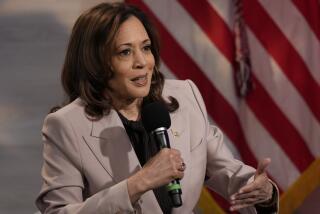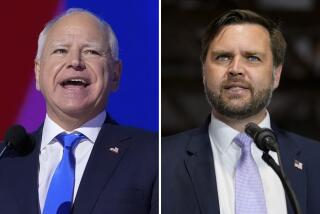Opening debate to cheeky commoners
“Sen. Clinton, I think you would make a great president,” says Gavin of Las Vegas, speaking to the camera in a homemade video on YouTube. “But there’s a question that deserves to be answered before the end of the primaries, because it could affect your ability to run against a strong Republican: Has your husband, Bill Clinton, engaged in adulterous behavior since he’s left office?” On the premise that there are no softballs in cyberspace, CNN has partnered up with the all-citizen TV website to host two presidential debates, with questions submitted by YouTube nation.
First up, the Democratic contenders, tonight in Charleston, S.C., a TV event moderated by Anderson Cooper. At CNN, they’ve been promoting the night like it’s “Guess Who’s Coming to Dinner,” urging the nation to take a seat at the table -- no jacket or tie required -- while remaining coy about the process: It took John Roberts, co-host of CNN’s weeklong “CNN/YouTube Debate Preview,” 55 minutes last week to mention that “CNN will be choosing which questions are used.”
He called the selection system a “highly secretive process,” conjuring bylaws too numerous to mention and a Cannes Film Festival-like jury sequestered for fear of tampering.
I take that to mean Gavin’s question, although teased on the broadcast, is probably toast, even if the Clinton campaign has already strategized and focus-grouped how the candidate will tackle her husband’s past when the time comes.
“We will make responsible editorial decisions about what will air during the debate,” e-mailed David Bohrman, CNN senior vice president and Washington bureau chief, when I asked if Gavin’s upload really stood a chance of getting onto the broadcast.
If the implication of involving YouTube is that Gavin, a town hall participant by virtue of nothing more exclusive than his Internet connection, can sail unfettered into the maw of a wide-open presidential campaign, the reality is something different.
CNN, after all, is still the gatekeeper here and as a news organization has to worry about maintaining access to the Clinton campaign.
“I think the candidates are banking on the fact that a journalist like you wouldn’t let a question like the one we just saw through,” Democratic strategist Steve McMahon told “Preview” host Roberts of the Gavin query.
Dan Rather, also on the broadcast, agreed that no journalist would venture to ask Gavin’s question. “Candidates do hate -- genuinely hate -- audience participation,” Rather said, “because they like to control the environment.”
In both these pockets of power -- broadcast news and politics -- everyone is staring at the Internet right now and wondering what role the medium will play, beyond its proven ability as a powerful fundraising tool.
Involving YouTube in a television debate has, at first blush, the feel of a stunt. Still, tonight’s debate promises at least to expose a clash of cultures, as the grungy, youth-oriented YouTube meets the buttoned-down campaign talking point.
As of Sunday morning, YouTube had received more than 2,300 uploads, the majority of questions on issues already presumed central to the stump (including affordable education and healthcare and the Iraq war).
But context matters. That question about the humanitarian crisis in Darfur, for instance, comes not as an abstraction but directly from several young aid workers standing with refugees near Darfur. “Before you answer this question,” one says, “imagine yourself the parent of one of these children.”
“Candidates will be out of their comfort zone,” Bohrman said in an earlier phone interview. “I don’t think a big broad policy answer will come through the right way.”
On National Public Radio last week, Bohrman noted the difficulty of adhering to the democratic ideals of a site on which users shape fame; the most popular uploaded video, he said, was the one asking whether California Gov. Arnold Schwarzenegger was elected as a cyborg to combat a future nuclear attack.
Still, I presume all the campaigns are logging long hours on YouTube, red-flagging the more off-center submissions -- the seven-second video of a housecat, for instance, with the words, “How can you protect my food in the future?” on the screen. A submission like that does touch on the dream of circumventing the mainstream media’s filter for political discourse.
It’s what makes documentary filmmaker Michael Moore such a spectacle of empowerment, creating guerrilla theater by blowing past various rules of decorum when it comes to people with microphones and people in power.
If tonight’s debate ends up looking like nothing more than the electorate getting a collective pat on the head from the Democratic hopefuls, in a TV event brought to you by a cable network that calls itself “The Most Trusted Name in News,” score another one for politics as usual.
More to Read
Get the L.A. Times Politics newsletter
Deeply reported insights into legislation, politics and policy from Sacramento, Washington and beyond. In your inbox three times per week.
You may occasionally receive promotional content from the Los Angeles Times.










